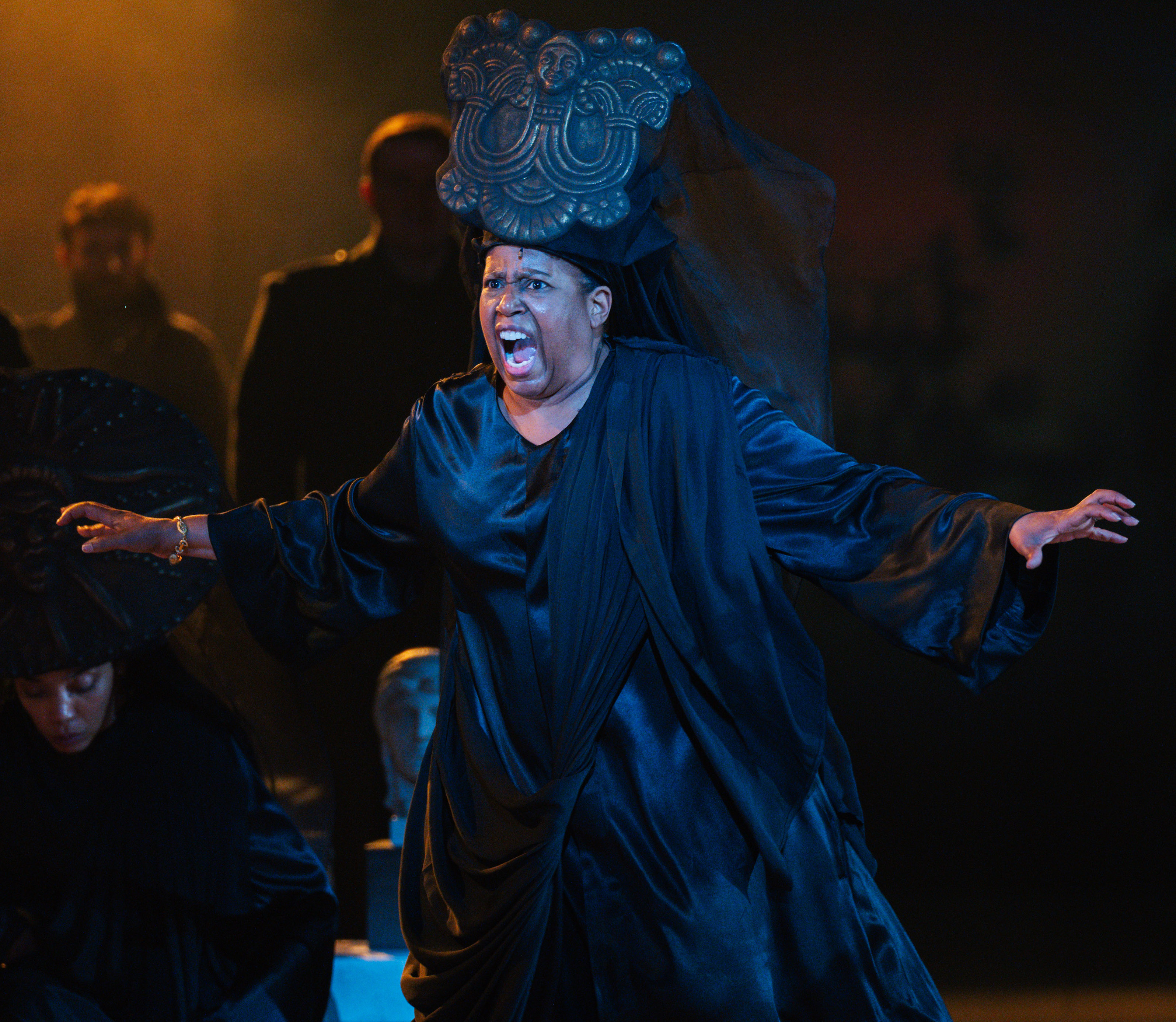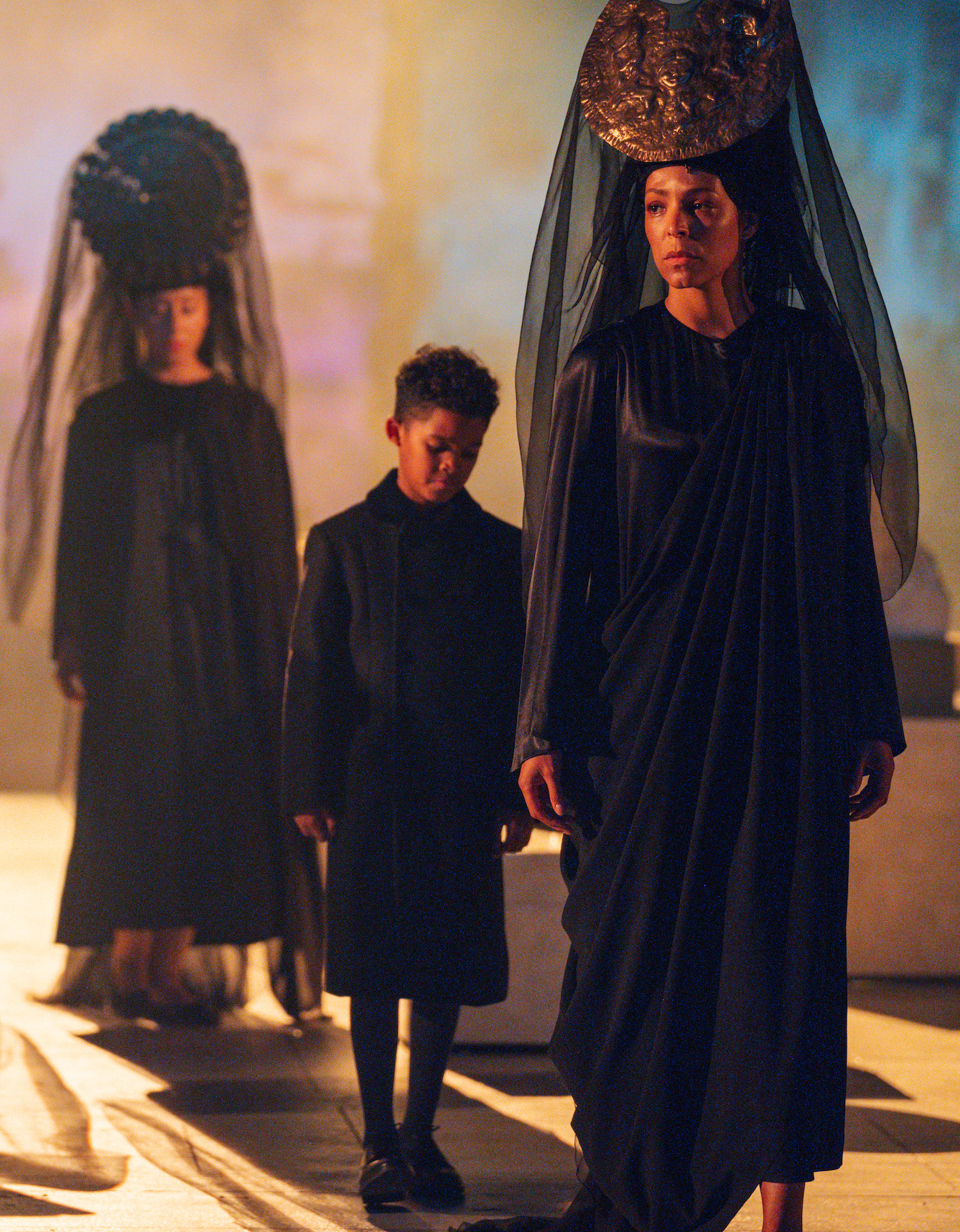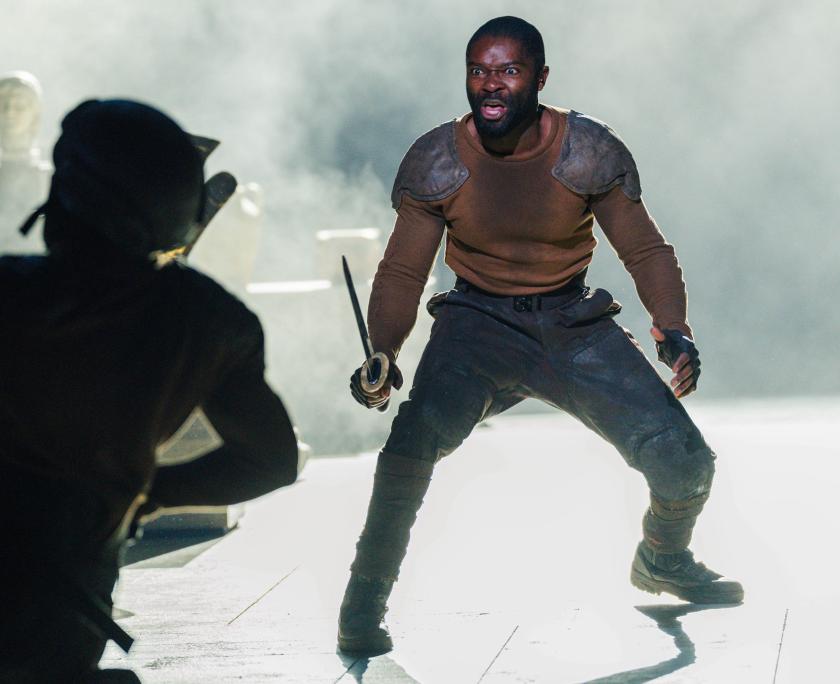The National’s new production of Coriolanus has to be one of the most handsome to appear on the Olivier stage. But it has arrived minus a key item: a hero whose end is tragic.
Maybe director Lyndsey Turner wasn’t aiming for that. Her protagonist, pugnaciously played by David Oyelowo, is more a fully functioning part of Shakespeare’s steel-trap of a play than a hero to understand and pity. In this fast-paced piece, Coriolanus rises, then falls, but there are no pit stops, no subplots, along the way. He has a family, but there’s virtually no family time to reveal a gentler side to this super-warrior. He only shows signs of softer emotions when his imperious mother and doleful wife come to beg him not to sack Rome, paradoxically the act of mercy that costs him his life.
Motoring on through the text at speed, this Coriolanus is mostly exasperated, progressing to all-out fury once his exasperation peaks. As an exemplar of the virtuous man of arms, he is possibly perfect, but as a dramatic character, not so much. Oyelowo can dispatch all his lines with impressive clenched-teeth anger, and he is superb in the fight scenes, leaping and manoeuvring with the skill of a martial arts expert, but he doesn’t let the audience in. We are watching a lucid examination of a process working itself out, not a dense study of a flawed nobleman in extremis.
 The other main points of interest here are the machinations of the squirrelly tribunes, representatives of the common people, whose prejudices they are adept at whipping along. And, in particular, there is Es Devlin’s extraordinary set to marvel at, dominated by a giant tea-cosy of a structure that riffs on classical pillars and is also used as a place to project outsize images and footage. Lifted up, it reveals a set that can flip from the interior of Volumnia’s house to a battlefield or the Senate.
The other main points of interest here are the machinations of the squirrelly tribunes, representatives of the common people, whose prejudices they are adept at whipping along. And, in particular, there is Es Devlin’s extraordinary set to marvel at, dominated by a giant tea-cosy of a structure that riffs on classical pillars and is also used as a place to project outsize images and footage. Lifted up, it reveals a set that can flip from the interior of Volumnia’s house to a battlefield or the Senate.
The flexibility of the set is also an aid to the pacing. Much as the National’s outgoing director, Rufus Norris, urged recently, this is a super-dynamic production that hardly pauses for breath, a piece for the TikTok generation. Scenes overlap with scenes, a fresh set of speakers arriving as the last turn upon their heels to leave. This becomes almost comic in Act 2 when a scene at an upmarket menswear outlet between the tribunes and the patrician Menenius is suddenly invaded by the mob, bearing placards.
The updating of costumes and set is rather unevenly done, inevitably. This is a world where film crews record speeches, but there are no mobile phones and warriors still use swords and daggers. The modernising seems to be a gesture towards underpinning the play’s contemporary resonances. The tribunes could pass for present-day spads, with Sicinius a woman in heels (Stephanie Street) and Brutus (Jordan Metcalfe) a young man in modish specs and grey lounge suit, a character who could have stepped out of the scripts of The Thick of It.
Are there big contemporary resonances here worth noting? Coriolanus has been said to owe something to the character of Sir Walter Raleigh, a proud man with no love of the lower orders. A Jacobean audience would presumably have been alert to familiar incidents in the text, but for a British audience Coriolanus is something of an anachronism now, a military figure with political status. His intemperate single-mindedness, especially towards the ignorance of the common people, rings alarm bells in an age where authoritarianism is on the rise globally. The vulnerability of the mob to scheming leaders, too, is a hardy perennial. But is either theme enhanced by modern clothing?
 There is still an ambition and scale to this staging to enjoy. Visually it’s a treat, never more so than when Volumnia (Pamela Nomvete, pictured above) and Virgilia (Kemi-Bo Jacobs, pictured right) and their retinue arrive, a stately procession in black flowing robes and giant metal headdresses. The music accompanying them, courtesy of the Balanescu Quartet, is swooning and eerie. Why not handle the whole piece this way? As a context, modern dress relegates the statuary in the Roman scenes, which includes the wolf suckling Romulus and Remus, to the status of fashionable art objects. The “otherness” of this culture, its codes and attitudes, is ever-present, but jarring with the contemporary notes.
There is still an ambition and scale to this staging to enjoy. Visually it’s a treat, never more so than when Volumnia (Pamela Nomvete, pictured above) and Virgilia (Kemi-Bo Jacobs, pictured right) and their retinue arrive, a stately procession in black flowing robes and giant metal headdresses. The music accompanying them, courtesy of the Balanescu Quartet, is swooning and eerie. Why not handle the whole piece this way? As a context, modern dress relegates the statuary in the Roman scenes, which includes the wolf suckling Romulus and Remus, to the status of fashionable art objects. The “otherness” of this culture, its codes and attitudes, is ever-present, but jarring with the contemporary notes.
Among the cast, a big hand for Peter Forbes as Menenius, a suited old buffer you might encounter at the 19th. He comes with hints of Polonius and Justice Shallow and, in this arid arena, stands out as a 3D man, even as he prattles on to the protesters about their lowly status and the importance of governing elites. In temperament, he serves as the anti-Volumnia, a fierce woman of unbending mind until circumstances force a change in her. Nomvete’s warning to her son that he will be “ab-hor-red” by future generations is a trisyllable word hurled out with chilling aggression. Holdbrook-Smith’s Aufidius, general of the Volscians, could do with more of her inner fire: he seems like a foil, a mechanism to bring Coriolanus low, rather than a fully formed character
The final tableau of the play is one of its most successful moments and offers a vantage point from which to reflect back on the whole. A bronze statue of Coriolanus in battle gear – Oyelowo artfully poses with a shield for this – has been commissioned by regretful Romans and Aufidius (the "noble memory” in his final speech), which his son stops to look at. It’s finally a sign of the play’s intent: to show how complex truths can be distilled into an image for mass manipulation. Coriolanus is now officially a state hero, whatever the truth of his personality; thus are a culture’s myths created.
- Coriolanus at Olivier, National Theatre until 9 November
- More theatre reviews on theartsdesk















Add comment